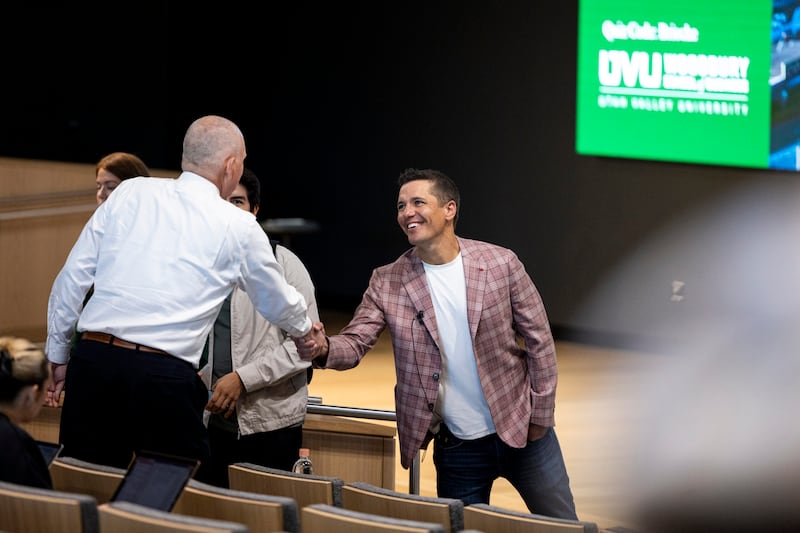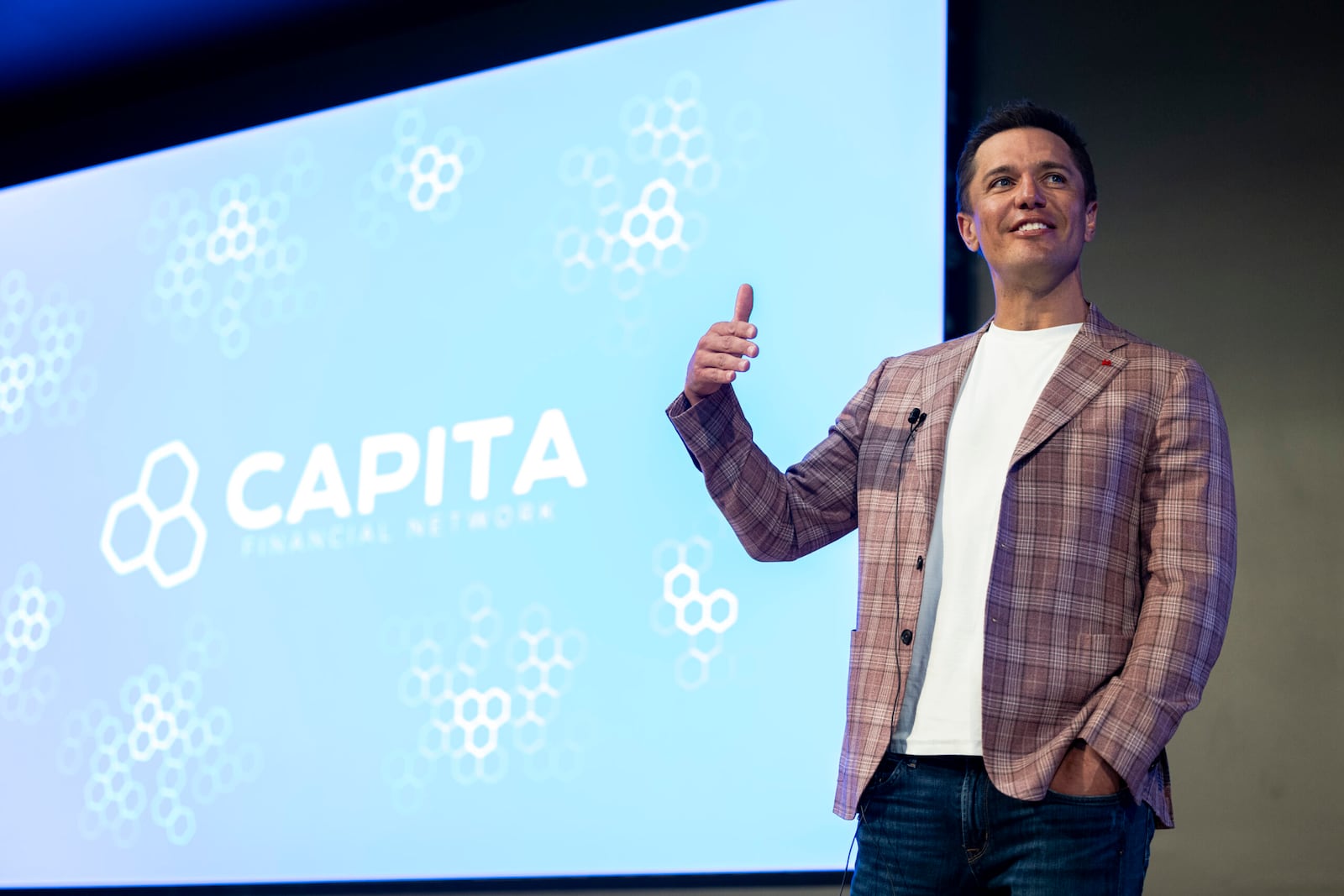Growing up, my family owned Summit Pizza Co., a mom-and-pop pizza place in small-town Kamas, Utah.
The advantage of growing up in a pizza restaurant was that I got to be hands-on in the business world from a very young age. From making dough to running the register, cleaning up and interacting with customers, I had a front-row seat to how a business should be run.
Luckily for me, my dad was an incredible role model who knew how to build and maintain lasting relationships with everyone around him. That quality ultimately led to both his success and mine.
A priority of caring about others runs in my family, so the key to our success came easy. While working for Summit Pizza Co. through high school, my coworkers would almost force me to run the cash register to ensure I would pull in the biggest tips for everyone to split later.
I loved our customers. Getting to know people or helping solve a customer’s problem were things I took pride in. I would put a positive spin on a negative situation and keep our name honorable by making things right and following through on our word, no matter what.
Money never trumps a relationship. That’s a truth I’ll never forget, and it’s something I still live by every day.
Wealth helps
When I served a two-year religious mission for The Church of Jesus Christ of Latter-day Saints, a very well-to-do businessman (and my mission president) inspired me with an important lesson I took to heart. He told me that creating wealth creates opportunities to help others and that you could influence good in increasingly important ways the more you earn.
I wanted to put this into practice. By the time I returned home, I was ready to make a name for myself. I knew I wanted to make good money, but I didn’t quite know what I wanted to do. I liked sales and people and had plenty of grit as far as financial risk was concerned. Combined, it was enough to get me started in the right direction.
In college, I became very successful through a string of sales jobs: phone sales, convention sales and selling marketing packages for companies. Those roles allowed me to earn and then invest those earnings in other directions. I read “Rich Dad Poor Dad” by Robert T. Kiyosaki and Sharon Lechter, did my own day trading, bought penny stocks and took out hard money loans. I learned a lot in a short amount of time.
For me, college wasn’t totally about going to Utah Valley University and getting my business degree—it was more about finishing what I started while also learning a lot, both through my classes and all I lost from investments and getting bad advice.
Mistakes led to additional knowledge and growth, and both were so necessary for starting Capita Financial Network years later.
Hundreds of lunches
The more I understood investing, the more I understood what I would eventually do as a business owner. Perhaps I could help others while simultaneously helping myself. I wondered if I could build relationships with customers and monetize them.
When I first started working, I took a job as a financial advisor as a means of survival. I was married, and we were in credit card debt after a couple of bad investments. I worked my way out of that debt by selling life insurance and annuities. That was my introduction to the financial world, and it led to increased stability for my family and me.
Still, I wanted to do more. In the back of my mind, I sketched out a business plan of what I wanted Capita to look like on a piece of paper. My vision was to create a holistic financial planning firm. We wouldn’t sell products for any specific company but instead wrap our hands around a person’s financial situation and give them advice on everything. In the long term, we would help figure out all the best ways to monetize their future.
When Capita launched in 2008, it wasn’t with much fanfare. Still, for a guy working from the back seat of his car, I found my way forward. There was a lot of driving around and taking people to lunch. I didn’t know what I was doing and had no true mentor to emulate. Still, I was approved for a company credit card, which I used as a launchpad.
That card had “LUNCHES ONLY” written on it instead of my name. From Monday through Friday, I booked lunches with my network and slowly built it up, whether they were a friend, a parent of a friend, a neighbor, a business owner, someone in the insurance industry or someone considered a competitor. Everything was spent on meeting and eating with people. That helped me grow.
Hundreds of lunches later, and after meeting everyone from estate planning attorneys and CPAs to Medicare agents, I was led in some good directions. My top two referring partners came from building relationships over sandwiches almost 15 years ago.It meant a lot of failure to get to that point, though—getting accustomed to going through what didn’t work in order to pivot and adjust to what did. That habit helped me build Capita while also accumulating my own assets.

As I did so, I made the best financial decisions I could, buying good stocks and real estate investments, earning far more than what was normal for someone my age. Because Capita wasn’t built out of necessity, I had the resources to grow in the right ways. For example, it took a while to hire an employee because I was nervous about the financial obligations of doing so. Gaining a better understanding led to hiring an assistant and two more assistants after that. Momentum was being created.
Sharing success
Once we had $80 million under management with TD Ameritrade, I realized Capita was getting bigger and needed additional assistance. I’m great at selling a concept, but I needed to back up everything I was promising. That meant finding the right advisor to manage our growing book of clients. I initially offered a job to an independent financial advisor who followed me around for a week. He had other goals, though, and working hard wasn’t one of them; he wanted more free time to play golf and lift weights.
Because he spent so much time with me and learned my secrets, I had a proposition: I wanted a referral for the best advisor he knew. Within two minutes, he suggested Zaccary Call, a representative on the rise. A cold call caught him at the right moment, and I sold him on joining me. He was expensive—he worked at Fidelity Investments, which paid their advisors quite well—but I had the resources I needed. Instead of buying more stocks, I invested in this new employee.
I’ll never regret doing so. From there, Zaccary and I kept building out our operations, hiring advisors from places like Fidelity and Goldman Sachs. The firms were larger than ours, but I was able to hire away some of their top talent.
Today, Zaccary is the president of our company and manages all of our advisors. It was a pivotal point when I realized the company wasn’t only about me—it was about what we could create together and on a scale where we could help a lot of people. The truth was, I could only meet with so many people per week. By duplicating all we did, we were able to serve many more through a unique platform. With no products to sell and no quotas to meet, we were able to connect and serve individuals in need of our expertise.
That led to Capita’s success. Sharing the vision around the company allowed us to bring in excellent advisors who attracted customers in return. By focusing on the individual and getting to know them, we were able to build the right investment plans for them. That’s our calling card, more or less, our secret sauce: getting to know clients and building the right portfolios for them.
On being your own mentor
In the beginning, I knew I could sell and figure everything out, even when there was so much I didn’t know. I’d be sitting in the front room of someone I was doing financial planning for, and they’d ask what I thought about Roth conversions, for example. I’d be so unfamiliar that I couldn’t offer up any opinions. I’d say I didn’t know, go home and quickly become a self-taught master.
That happened often. Most people want to pretend they know everything, but I went a different route. I was confident enough to ask them to trust me with their portfolio, then smart enough to tell them I’d get back to them later. That’s how I learned, figuring out one thing at a time.
The thousands of blunders we experienced built Capita into what it is today. Being transparent helped us retain clients and get referrals. Mistakes will always be made, and in a way, I was lucky enough to make enough with my own money that it saved me from making those same mistakes with my clients.
One of my first employees made a huge mistake that cost the client $20,000. Even then, we survived it. Realizing mistakes happen with employees is big. When there’s accountability, though, nobody needs to get fired. Was a lesson learned? What can be improved? Mistakes can be handled that way with employees, and you can still make things right with clients.
Relationships above all
While good relationships won’t surface right away, they are everything. No amount of money will ever trump them. Making sure we do a good job in that capacity is what keeps me up at night.
To that end, I realized years ago that my success in business can’t override the failures I have at home. I once thought providing a good lifestyle for my family could compensate for a lack of being present at home and giving my wife emotional support. I’ve since learned otherwise, and I understand that it’s important to double down on my relationship with my family.
In our early days, I probably focused on myself more than I needed to. I wanted clients to be impressed by me. By hiring and delegating to other people, investing in them and building systems that lead to growth, we found our truest path to success.
Discovering this was almost a happy accident. It was a big risk to hire someone like Zaccary, who cost double what my mortgage did. He was more expensive than anything I’ve ever taken a chance on, but it was also the smartest thing I ever did. It allowed me to focus on what I was best at while he focused on his strengths. It was less about me and more about us.
This allowed me to lessen my grip and hang on less tightly. In 2022, my wife and I conducted an experiment. We went to Africa for a month, and I decided to shut my phone down the whole time. I wanted to see what bottlenecks might surface without me around. To come back and see it running seamlessly weeks later changed my entire outlook: I’d built a company that didn’t need me anymore.
The company has enterprise value, and that’s invaluable. I can walk into our support staff room and find 15 people processing paperwork and helping clients. I can look them in the eye and see if they’re having a rough day because I’ve been there. I’ve done everything they’re doing, sometimes from the backseat of my car. I’ve experienced what it’s like to stay up until two in the morning, filling out insurance applications so that I could feed my family.
As we continue to grow in our abilities, it increases what we can offer. Strengthening one another and being empathic of each other’s plights leads us to better places. Nobody has to do it on their own.


